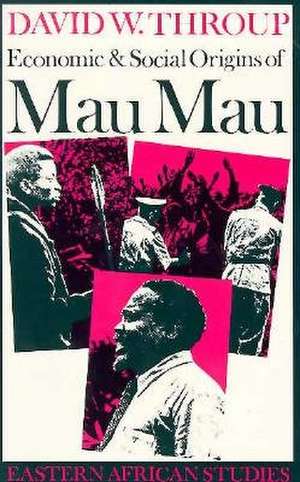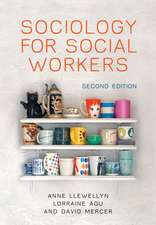Economic & Social Origins of Mau Mau, 1945–1953: Eastern African Studies: Eastern African Studies
Autor David Throupen Limba Engleză Paperback – 16 mai 2023
This story of Kenya in the decade before the outbreak of the Mau Mau emergency presents an integrated view of imperial government as well as examining the social and economic causes of the Kikuyu revolt. Dr. Throup combines traditional Imperial History with its emphasis on the high politics of “The Official Mind” in the Colonial Office or in Government House with the new African historiography that concentrates on the people themselves.
Sir Philip Mitchell was the proconsul chosen to reassert metropolitan authority. Under Kenyatta’s leadership the Kenya African Union mobilized a popular constituency among the peasantry. In Nairobi the Kikuyu street gangs linked up with the militant Kikuyu trade unions, led by Fred Kubai and Bildad Kaggia, to challenge Kenyatta’s leadership.
The Mau Mau movement, as it was called by the government, was an alliance between three groups of discontented Kikuyu: the urban unemployed and destitute, the dispossessed squatters from the White Highlands and the tenants and members of the junior clans in the Kikuyu reserves.
The revolt was a dominating factor in convincing the conservative imperial government that the cost of repression in the African colonies was not worth the troops and resources.
Sir Philip Mitchell was the proconsul chosen to reassert metropolitan authority. Under Kenyatta’s leadership the Kenya African Union mobilized a popular constituency among the peasantry. In Nairobi the Kikuyu street gangs linked up with the militant Kikuyu trade unions, led by Fred Kubai and Bildad Kaggia, to challenge Kenyatta’s leadership.
The Mau Mau movement, as it was called by the government, was an alliance between three groups of discontented Kikuyu: the urban unemployed and destitute, the dispossessed squatters from the White Highlands and the tenants and members of the junior clans in the Kikuyu reserves.
The revolt was a dominating factor in convincing the conservative imperial government that the cost of repression in the African colonies was not worth the troops and resources.
Din seria Eastern African Studies
-
 Preț: 204.38 lei
Preț: 204.38 lei -
 Preț: 279.67 lei
Preț: 279.67 lei -
 Preț: 259.52 lei
Preț: 259.52 lei -
 Preț: 252.77 lei
Preț: 252.77 lei -
 Preț: 260.45 lei
Preț: 260.45 lei -
 Preț: 270.78 lei
Preț: 270.78 lei -
 Preț: 256.63 lei
Preț: 256.63 lei - 23%
 Preț: 480.66 lei
Preț: 480.66 lei -
 Preț: 256.63 lei
Preț: 256.63 lei -
 Preț: 260.07 lei
Preț: 260.07 lei - 23%
 Preț: 478.74 lei
Preț: 478.74 lei -
 Preț: 232.74 lei
Preț: 232.74 lei -
 Preț: 263.54 lei
Preț: 263.54 lei -
 Preț: 259.09 lei
Preț: 259.09 lei -
 Preț: 280.21 lei
Preț: 280.21 lei -
 Preț: 274.07 lei
Preț: 274.07 lei -
 Preț: 262.02 lei
Preț: 262.02 lei -
 Preț: 263.16 lei
Preț: 263.16 lei -
 Preț: 235.80 lei
Preț: 235.80 lei -
 Preț: 274.07 lei
Preț: 274.07 lei - 23%
 Preț: 471.78 lei
Preț: 471.78 lei -
 Preț: 232.38 lei
Preț: 232.38 lei - 23%
 Preț: 477.11 lei
Preț: 477.11 lei -
 Preț: 257.18 lei
Preț: 257.18 lei -
 Preț: 236.02 lei
Preț: 236.02 lei -
 Preț: 208.49 lei
Preț: 208.49 lei -
 Preț: 278.30 lei
Preț: 278.30 lei -
 Preț: 286.90 lei
Preț: 286.90 lei -
 Preț: 257.78 lei
Preț: 257.78 lei - 55%
 Preț: 90.92 lei
Preț: 90.92 lei - 23%
 Preț: 485.86 lei
Preț: 485.86 lei -
 Preț: 258.49 lei
Preț: 258.49 lei -
 Preț: 257.92 lei
Preț: 257.92 lei -
 Preț: 258.35 lei
Preț: 258.35 lei -
 Preț: 241.86 lei
Preț: 241.86 lei -
 Preț: 223.05 lei
Preț: 223.05 lei - 19%
 Preț: 480.21 lei
Preț: 480.21 lei -
 Preț: 258.49 lei
Preț: 258.49 lei -
 Preț: 258.06 lei
Preț: 258.06 lei -
 Preț: 240.86 lei
Preț: 240.86 lei -
 Preț: 240.51 lei
Preț: 240.51 lei -
 Preț: 241.64 lei
Preț: 241.64 lei
Preț: 276.77 lei
Nou
Puncte Express: 415
Preț estimativ în valută:
52.98€ • 57.56$ • 44.53£
52.98€ • 57.56$ • 44.53£
Carte tipărită la comandă
Livrare economică 21 aprilie-05 mai
Preluare comenzi: 021 569.72.76
Specificații
ISBN-13: 9780821408841
ISBN-10: 0821408844
Pagini: 304
Dimensiuni: 140 x 216 x 23 mm
Greutate: 0.45 kg
Ediția:1
Editura: Ohio University Press
Colecția Ohio University Press
Seria Eastern African Studies
ISBN-10: 0821408844
Pagini: 304
Dimensiuni: 140 x 216 x 23 mm
Greutate: 0.45 kg
Ediția:1
Editura: Ohio University Press
Colecția Ohio University Press
Seria Eastern African Studies
Recenzii
“This is the first full–length study of Kenya’s post–war crisis, the seed–bed of Mau Mau. The scholarship is encyclopaedic, the writing sharp and the analysis clear. What we have is a tragedy in the classic sense, with passionate visions of the future held by rulers and people locked in a conflict which could only be resolved by violence.”—John Lonsdale, Fellow of Trinity College, Cambridge
Notă biografică
David Throup is a Bye Fellow of Magdalene College, Cambridge and is Associate Professor of African History in the University of Virginia.
Descriere
This story of Kenya in the decade before the outbreak of the Mau Mau emergency presents an integrated view of imperial government as well as examining the social and economic causes of the Kikuyu revolt. Dr. Throup combines traditional Imperial History with its emphasis on the high politics of “The Official Mind” in the Colonial Office or in Government House with the new African historiography that concentrates on the people themselves.
Sir Philip Mitchell was the proconsul chosen to reassert metropolitan authority. Under Kenyatta’s leadership the Kenya African Union mobilized a popular constituency among the peasantry. In Nairobi the Kikuyu street gangs linked up with the militant Kikuyu trade unions, led by Fred Kubai and Bildad Kaggia, to challenge Kenyatta’s leadership.
The Mau Mau movement, as it was called by the government, was an alliance between three groups of discontented Kikuyu: the urban unemployed and destitute, the dispossessed squatters from the White Highlands and the tenants and members of the junior clans in the Kikuyu reserves.
The revolt was a dominating factor in convincing the conservative imperial government that the cost of repression in the African colonies was not worth the troops and resources.
Sir Philip Mitchell was the proconsul chosen to reassert metropolitan authority. Under Kenyatta’s leadership the Kenya African Union mobilized a popular constituency among the peasantry. In Nairobi the Kikuyu street gangs linked up with the militant Kikuyu trade unions, led by Fred Kubai and Bildad Kaggia, to challenge Kenyatta’s leadership.
The Mau Mau movement, as it was called by the government, was an alliance between three groups of discontented Kikuyu: the urban unemployed and destitute, the dispossessed squatters from the White Highlands and the tenants and members of the junior clans in the Kikuyu reserves.
The revolt was a dominating factor in convincing the conservative imperial government that the cost of repression in the African colonies was not worth the troops and resources.











